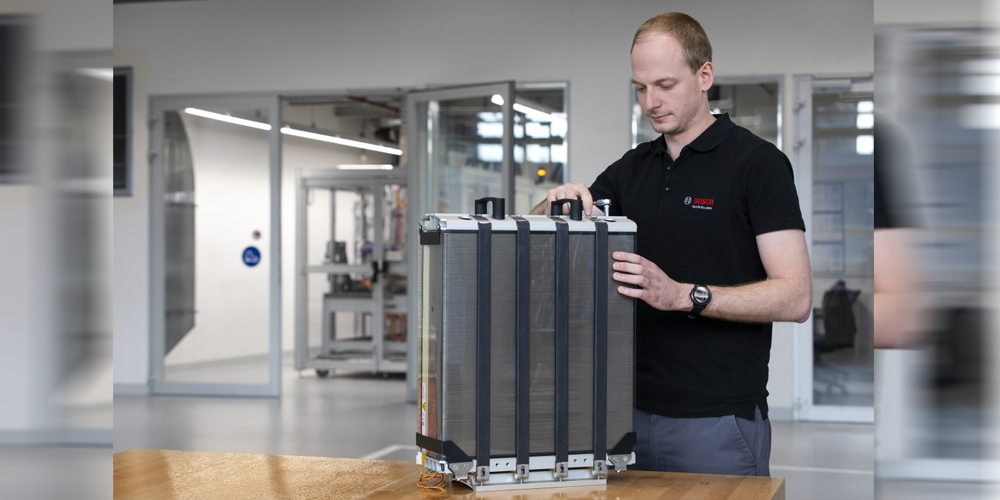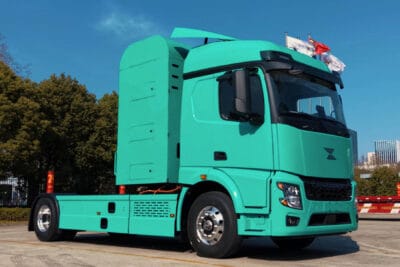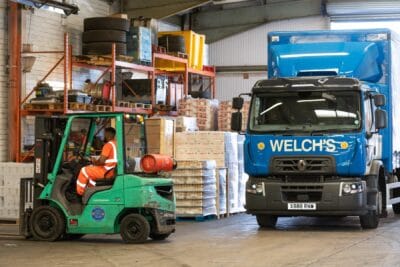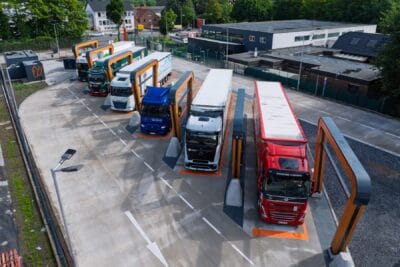First customers for Bosch fuel cell trucks
There has been an update on the series production of fuel cell systems for trucks and cars that Bosch plans to launch in 2022. The Group presented a new prototype in Stuttgart and has named their first customers.
At a press conference in the German region of Stuttgart-Feuerbach, Bosch showed journalists its new fuel cell for trucks on the system test bench. Bosch has already received its first series orders. They are not limiting themselves to the axle system, such as the hydrogen trucks for the U.S. startup Nikola will be supplied with the entire fuel cell system.
“We expect the fuel cell to have a market share of 13 per cent in heavy commercial vehicles in 2030,” says Jürgen Gerhardt, the project manager responsible. Bosch CEO Volkmar Denner states that up to 20 per cent of all electric vehicles could be on the road with fuel cells by 2030. The supplier wants to reduce the currently high costs (about three times those of a diesel engine) by increasing production volumes, but Bosch did not mention specifics in this regard. The German company pointed out that the “expected higher CO2 price” would cause the cost of diesel trucks to rise.
The stack does not come from Bosch itself, but from Swedish fuel cell specialist Powercell. The cooperation has been in place since April 2019, and in November the famous German supplier also bought a financial stake in the Swedish company.
The technology developed by Bosch and Powercell can also be transferred to cars. According to the Bosch CEO their first customer is also a carmaker. “Not for the entire system, but for components,” says Denner. But he did not mention the name of the carmaker. Volkswagen can at least be ruled out, since VW boss Herbert Diess recently told corporate executives that the fuel cell was “not an alternative to car engines for a foreseeable time horizon of at least a decade.” He added that the subject was being taken back to basics.
Bosch is one of the few global automotive suppliers still organised as a limited liability company and not as a stock corporation. Despite the new fuel cell customers, Bosch is feeling the effects of declining car production worldwide as well as declining diesel demand. Increasing this burden are weaker markets in China and India and the costs of restructuring the mobility division. In the Mobility Solutions division, sales for 2019 stagnated at 47 billion euros, with group-wide sales of just under 78 billion euros. Earnings before interest and taxes fell from 5.3 to 3 billion euros. “Considering the situation around us, we can be satisfied with this,” said Denner. “Despite the challenging economic situation, we continue to invest in important growth areas. In its announcement on its business figures, Bosch states that it will spend 500 million euros this year” on electromobility alone, including the fuel cell.
Denner continues to reject battery cell production in the company’s product profile. With the more complex fuel cell technology, the supplier not only wants to stand out but also to secure jobs. Due to declining demand, employment at some of the Bosch locations that is dependent on combustion technology is now on unsteady ground. For this reason, the company has set up hydrogen projects at precisely these locations, including Stuttgart-Feuerbach. Nevertheless, over 3,000 jobs will be lost at German sites.
handelsblatt.com, automobilwoche.de (both in German), bosch-presse.com (2019 business report)





0 Comments